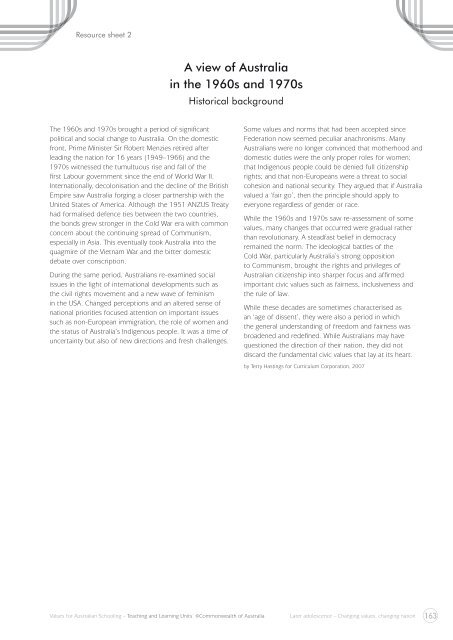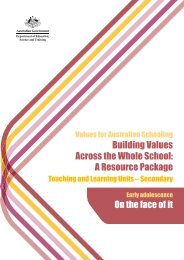Changing values, changing nation - Saint Ignatius' Moodle Community
Changing values, changing nation - Saint Ignatius' Moodle Community
Changing values, changing nation - Saint Ignatius' Moodle Community
Create successful ePaper yourself
Turn your PDF publications into a flip-book with our unique Google optimized e-Paper software.
Resource sheet 2<br />
A view of Australia<br />
in the 1960s and 1970s<br />
Historical background<br />
The 1960s and 1970s brought a period of significant<br />
political and social change to Australia. On the domestic<br />
front, Prime Minister Sir Robert Menzies retired after<br />
leading the <strong>nation</strong> for 16 years (1949–1966) and the<br />
1970s witnessed the tumultuous rise and fall of the<br />
first Labour government since the end of World War II.<br />
Inter<strong>nation</strong>ally, decolonisation and the decline of the British<br />
Empire saw Australia forging a closer partnership with the<br />
United States of America. Although the 1951 ANZUS Treaty<br />
had formalised defence ties between the two countries,<br />
the bonds grew stronger in the Cold War era with common<br />
concern about the continuing spread of Communism,<br />
especially in Asia. This eventually took Australia into the<br />
quagmire of the Vietnam War and the bitter domestic<br />
debate over conscription.<br />
During the same period, Australians re-examined social<br />
issues in the light of inter<strong>nation</strong>al developments such as<br />
the civil rights movement and a new wave of feminism<br />
in the USA. Changed perceptions and an altered sense of<br />
<strong>nation</strong>al priorities focused attention on important issues<br />
such as non-European immigration, the role of women and<br />
the status of Australia’s Indigenous people. It was a time of<br />
uncertainty but also of new directions and fresh challenges.<br />
Some <strong>values</strong> and norms that had been accepted since<br />
Federation now seemed peculiar anachronisms. Many<br />
Australians were no longer convinced that motherhood and<br />
domestic duties were the only proper roles for women;<br />
that Indigenous people could be denied full citizenship<br />
rights; and that non-Europeans were a threat to social<br />
cohesion and <strong>nation</strong>al security. They argued that if Australia<br />
valued a ‘fair go’, then the principle should apply to<br />
everyone regardless of gender or race.<br />
While the 1960s and 1970s saw re-assessment of some<br />
<strong>values</strong>, many changes that occurred were gradual rather<br />
than revolutionary. A steadfast belief in democracy<br />
remained the norm. The ideological battles of the<br />
Cold War, particularly Australia’s strong opposition<br />
to Communism, brought the rights and privileges of<br />
Australian citizenship into sharper focus and affirmed<br />
important civic <strong>values</strong> such as fairness, inclusiveness and<br />
the rule of law.<br />
While these decades are sometimes characterised as<br />
an ‘age of dissent’, they were also a period in which<br />
the general understanding of freedom and fairness was<br />
broadened and redefined. While Australians may have<br />
questioned the direction of their <strong>nation</strong>, they did not<br />
discard the fundamental civic <strong>values</strong> that lay at its heart.<br />
by Terry Hastings for Curriculum Corporation, 2007<br />
Values for Australian Schooling – Teaching and Learning Units ©Commonwealth of Australia<br />
Later adolescence – <strong>Changing</strong> <strong>values</strong>, <strong>changing</strong> <strong>nation</strong><br />
163







